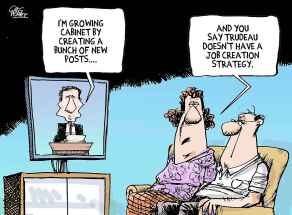Schtick struggles for spot in ‘post-parody’ world
Read this article for free:
or
Already have an account? Log in here »
To continue reading, please subscribe:
Monthly Digital Subscription
$0 for the first 4 weeks*
- Enjoy unlimited reading on winnipegfreepress.com
- Read the E-Edition, our digital replica newspaper
- Access News Break, our award-winning app
- Play interactive puzzles
*No charge for 4 weeks then price increases to the regular rate of $19.00 plus GST every four weeks. Offer available to new and qualified returning subscribers only. Cancel any time.
Monthly Digital Subscription
$4.75/week*
- Enjoy unlimited reading on winnipegfreepress.com
- Read the E-Edition, our digital replica newspaper
- Access News Break, our award-winning app
- Play interactive puzzles
*Billed as $19 plus GST every four weeks. Cancel any time.
To continue reading, please subscribe:
Add Free Press access to your Brandon Sun subscription for only an additional
$1 for the first 4 weeks*
*Your next subscription payment will increase by $1.00 and you will be charged $16.99 plus GST for four weeks. After four weeks, your payment will increase to $23.99 plus GST every four weeks.
Read unlimited articles for free today:
or
Already have an account? Log in here »
Hey there, time traveller!
This article was published 20/07/2018 (2704 days ago), so information in it may no longer be current.
Existing in some cringey, uneasy territory between comedy, prank and performance art, Sacha Baron Cohen’s latest project, Who is America? (on Showtime and streaming on Crave), is provoking both buzz and backlash.
With the help of costumes, makeup and prosthetics, the British comic plays several outsize characters, talking abject nonsense and gleefully violating social norms, all while interacting with unsuspecting American citizens.
In a series of spoof interviews, Baron Cohen explores a divided nation. And he seems to be making it more divided — starting with the critics.
Some commentators view Baron Cohen’s excruciating comedy as the kind of satirical acid-bath America needs right now, calling it “urgently resonant,” “provocative and quick-witted” and likely to “spark a very deep moral conversation.” Others dismiss the show’s techniques as “toothless,” “flimsy,” “dull” and “cheap.”
Sarah Palin accuses the “evil, exploitative and sick” Baron Cohen of “spewing disdain for America’s heartland” — not surprising, since she got taken in, along with several current and former politicians.
But perhaps the biggest criticism of Baron Cohen — and this seems to be a nonpartisan response — is that his timing is off. Not his comic timing but his historical timing.
A lot of this discussion comes under the now common question about satire in the age of Donald Trump. As Hank Steuver of the Washington Post suggests, “Our world has become as absurd as anything Cohen could conceive.” How can a comedian — even an outrageous one like Baron Cohen — top the surrealism of last week’s Trump-Putin press conference, for example, or the surreal-on-surreal spectacle of Trump’s later “corrections” of that event?
On top of that, at a time when white supremacists, Holocaust deniers and/or outright neo-Nazis are running in 2018 state and national races in the U.S., Baron Cohen’s trick of getting people to say appalling things out loud is not quite as novel as it once was. “America has caught up to Sacha Baron Cohen,” writes David Sims in The Atlantic, referring to a newly emboldened, bigoted and shame-free strain of public discourse.
For others, Baron Cohen’s reliance on elaborate lies feels problematic in an age of destabilizing attacks on objective reality, when facts are dismissed as Fake News. One of the show’s characters, Billy Wayne Ruddick, Jr., is an Alex Jones-style conspiracy nut whose website, Truthbrary.org., is a stew of random fonts, creative punctuation and that’s-what-they-want-you-to-think paranoia. In other words, it’s identical to a zillion other sites done in deadly earnest. Operating at a flattened-out level of “post-parody,” as Wired magazine calls it, this makes for a singularly depressing form of comedy.
Another beef is that Baron Cohen uses a form of entrapment, with some commentators suggesting that people go along with his antics just to be nice. This argument only goes so far. There is simply no way in which joining in a singalong of “Throw the Jew Down the Well” — a highly revealing lowlight from Baron Cohen’s 2006 Borat movie — can be construed as “nice.”
And while the wily comedian uses false pretenses to get his interviews, the encounters are not covertly taped without the subjects’ permission. These people are agreeing to speak in front of cameras. If you guffaw at rape jokes while the tape is rolling — as one gun lover does in the first episode — you shouldn’t be surprised by blowback. Baron Cohen reveals people as they are.

One of Baron Cohen’s new characters is a muscle-bound Israeli security expert who suggests America’s school shooting problem could be solved by arming “gifted” kindergarteners. He manages to get several people to agree to this comically obscene idea, even getting them to promote “Gunimals” — pistols stuffed inside plush animals — and to endorse three-week training courses that supply toddlers with “a rudimentary knowledge of mortars.” Turns out, NRA supporters and 2nd Amendment fanatics in Congress really, really like their guns.
Meanwhile, Bernie Sanders remains essentially Bernie-ish in his brush with Baron Cohen’s conspiracy theorist character. Sanders comes off as decent, dogged and perplexed by the idiocy of Billy Wayne, who wants to solve income inequality by shoving the 99 per cent into the one per cent, even as Sanders explains that everyone can’t be the one per cent, because then it wouldn’t be one per cent.
Finally, some critics suggest that Baron Cohen’s ruthless exploitation of America’s deep divides isn’t helping. Certainly, the segments that mix things up a little are more interesting. In what seems like a typically awkward set-up, Baron Cohen, posing as a grey-ponytailed uber-liberal (“I’m a cisgender white heterosexual male, for which I apologize,”), arrives for supper at the South Carolina home of two staunch Christian Republicans. He starts talking about his open marriage, adding that his partner is currently having an affair with a porpoise. His conservative hosts might be a bit credulous for buying into loony-left stereotypes, but this sequence also shows the couple to be polite, open, curious and very concerned.
“How does one compete with … a sea mammal?” asks the husband. That’s a hard question, but an even harder one is posed by the series’ title. Who is America? And can Baron Cohen’s comic shock tactics get us any closer to the answer?

Studying at the University of Winnipeg and later Toronto’s York University, Alison Gillmor planned to become an art historian. She ended up catching the journalism bug when she started as visual arts reviewer at the Winnipeg Free Press in 1992.
Our newsroom depends on a growing audience of readers to power our journalism. If you are not a paid reader, please consider becoming a subscriber.
Our newsroom depends on its audience of readers to power our journalism. Thank you for your support.










